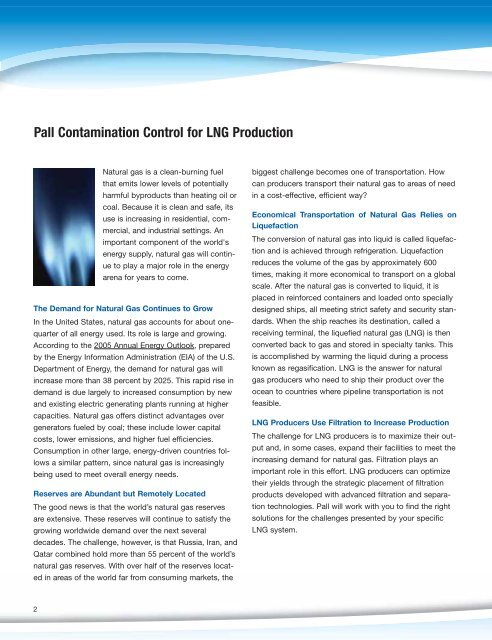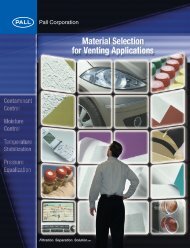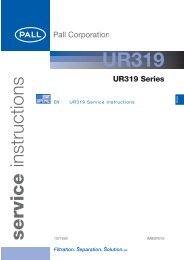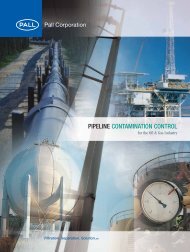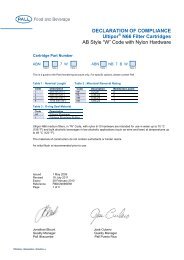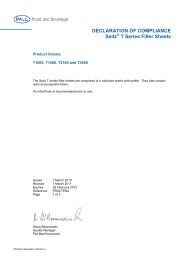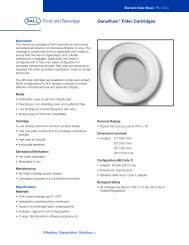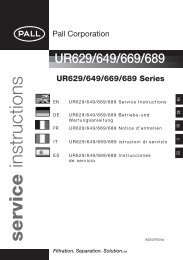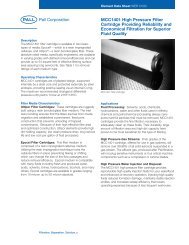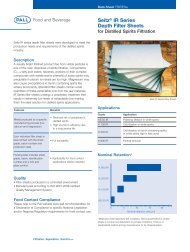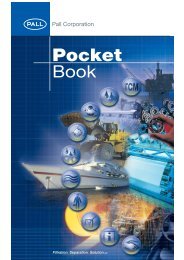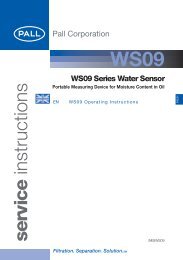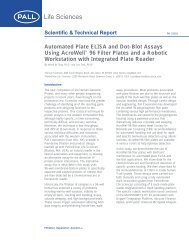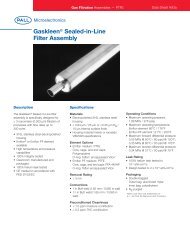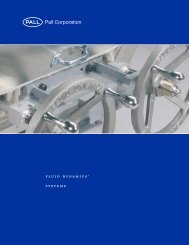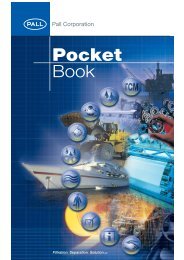Contamination Control for LNG Production - Pall Corporation
Contamination Control for LNG Production - Pall Corporation
Contamination Control for LNG Production - Pall Corporation
You also want an ePaper? Increase the reach of your titles
YUMPU automatically turns print PDFs into web optimized ePapers that Google loves.
<strong>Pall</strong> <strong>Contamination</strong> <strong>Control</strong> <strong>for</strong> <strong>LNG</strong> <strong>Production</strong><br />
Natural gas is a clean-burning fuel<br />
that emits lower levels of potentially<br />
harmful byproducts than heating oil or<br />
coal. Because it is clean and safe, its<br />
use is increasing in residential, commercial,<br />
and industrial settings. An<br />
important component of the world's<br />
energy supply, natural gas will continue<br />
to play a major role in the energy<br />
arena <strong>for</strong> years to come.<br />
The Demand <strong>for</strong> Natural Gas Continues to Grow<br />
In the United States, natural gas accounts <strong>for</strong> about onequarter<br />
of all energy used. Its role is large and growing.<br />
According to the 2005 Annual Energy Outlook, prepared<br />
by the Energy In<strong>for</strong>mation Administration (EIA) of the U.S.<br />
Department of Energy, the demand <strong>for</strong> natural gas will<br />
increase more than 38 percent by 2025. This rapid rise in<br />
demand is due largely to increased consumption by new<br />
and existing electric generating plants running at higher<br />
capacities. Natural gas offers distinct advantages over<br />
generators fueled by coal; these include lower capital<br />
costs, lower emissions, and higher fuel efficiencies.<br />
Consumption in other large, energy-driven countries follows<br />
a similar pattern, since natural gas is increasingly<br />
being used to meet overall energy needs.<br />
Reserves are Abundant but Remotely Located<br />
The good news is that the world’s natural gas reserves<br />
are extensive. These reserves will continue to satisfy the<br />
growing worldwide demand over the next several<br />
decades. The challenge, however, is that Russia, Iran, and<br />
Qatar combined hold more than 55 percent of the world’s<br />
natural gas reserves. With over half of the reserves located<br />
in areas of the world far from consuming markets, the<br />
biggest challenge becomes one of transportation. How<br />
can producers transport their natural gas to areas of need<br />
in a cost-effective, efficient way?<br />
Economical Transportation of Natural Gas Relies on<br />
Liquefaction<br />
The conversion of natural gas into liquid is called liquefaction<br />
and is achieved through refrigeration. Liquefaction<br />
reduces the volume of the gas by approximately 600<br />
times, making it more economical to transport on a global<br />
scale. After the natural gas is converted to liquid, it is<br />
placed in rein<strong>for</strong>ced containers and loaded onto specially<br />
designed ships, all meeting strict safety and security standards.<br />
When the ship reaches its destination, called a<br />
receiving terminal, the liquefied natural gas (<strong>LNG</strong>) is then<br />
converted back to gas and stored in specialty tanks. This<br />
is accomplished by warming the liquid during a process<br />
known as regasification. <strong>LNG</strong> is the answer <strong>for</strong> natural<br />
gas producers who need to ship their product over the<br />
ocean to countries where pipeline transportation is not<br />
feasible.<br />
<strong>LNG</strong> Producers Use Filtration to Increase <strong>Production</strong><br />
The challenge <strong>for</strong> <strong>LNG</strong> producers is to maximize their output<br />
and, in some cases, expand their facilities to meet the<br />
increasing demand <strong>for</strong> natural gas. Filtration plays an<br />
important role in this ef<strong>for</strong>t. <strong>LNG</strong> producers can optimize<br />
their yields through the strategic placement of filtration<br />
products developed with advanced filtration and separation<br />
technologies. <strong>Pall</strong> will work with you to find the right<br />
solutions <strong>for</strong> the challenges presented by your specific<br />
<strong>LNG</strong> system.<br />
2


